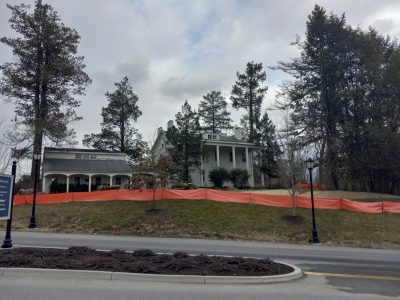Toll Brothers, Town Historian Tussle Over Chappaqua Crossing House
News Based on facts, either observed and verified directly by the reporter, or reported and verified from knowledgeable sources.

The New Castle Town Board must decide whether to grant luxury homebuilder Toll Brothers relief from the Chappaqua Crossing site plan requirement to preserve the exterior and adaptively reuse an 1850s farmhouse on the property.
Representatives of the various entities comprising the current Chappaqua Crossing ownership, including Toll Brothers, which is building the 91-townhome East Village, once again appealed to the board during a public hearing last Tuesday to permit the construction of a new clubhouse for those residents. The Thomas V. Wright House is located near the Route 117 entrance and exit to the former Reader’s Digest campus.
Preserving the house is estimated to cost at least 25 percent more than building a new clubhouse, said attorney Diana Kovlev, representing multiple limited liability companies that comprise the current Chappaqua Crossing ownership.
Instead, the exterior of a new structure would be built to look similar to the façade of the existing house.
“Preservation of the guest house, as it had been previously discussed, is really a very expensive undertaking that in this instance does not really make sense,” Kolev said. “It’s located on a private property and it will not be open to the public. We’re really only talking about the façade that is visible. The foundation is likely to become unstable and the numerous additions and renovations to the guest house over the years have really greatly diminished its historic value.”
Architect David Ball, speaking on behalf of Toll Brothers, said despite its age the house is not on the National Register of Historic Places, and the work done on the house, mostly from the 1960s to the 1980s, has diminished the quality of the architecture and the structure’s presence.
Small rooms and low ceilings would be unconducive to using the house as a clubhouse, and bringing a nearly 170-year-old house up to code for a different use in 2023 presents problems, he said.
“So, you’re talking about asbestos lead paint, redoing the structure, energy code issues, all these things to make this existing house built in the 1850s viable as a commercial use is really a challenge,” Ball said.
Toll Brothers would be open to preserving pieces of the house, such as the floorboards, for inclusion in a new structure.
Town Historian Gray Williams countered that the house is not landmarked or on the registers because none of its previous owners, including Reader’s Digest, would consent to that designation. However, if an owner had applied it would certainly be a town landmark, and there’s a strong likelihood it would be included on the state and national historic registers as well, he said.
Williams bristled at the idea of trying to recreated the exterior of the house and told the Town Board that if it relieves Toll Brothers of the requirement to preserve the house, then let them put up a new building but without trying to mimic the existing structure’s exterior.
“Of course, it just would not be any more than a piece of reproduction furniture would be an acceptable substitute for a genuine antique or a studio copy for an original work of art,” Williams said. “An authentic historic building would be replaced by the equivalent of a staged set.”
A representative from the state historic preservation office is reviewing the property, he said.
Felix Charney, the principal of Chappaqua Crossing developer Summit Greenfield who agreed to the house’s preservation, said of the more than 150 conditions imposed by the town for site plan approval, some were positive and improved the project, others were needed and some turned out to have gone too far.
He said that residents who will choose to live in the townhomes expect a certain quality.
“People are moving there for quality of life, to stay in a community they love and want to have a non-maintenance lifestyle, and unfortunately, the condition that’s been placed upon us to preserve a small portion of this building, I think, probably, is a bit of an overreach, and we’re smarter and we’re wiser and we’re suggesting that there’s a whole host of reasons why there’s a better way,” Charney said.
Last June, Charney estimated that as much as $850,000 could be saved building a new clubhouse.
During the hearing, Chappaqua architect William Spade said a company with the resources of Toll Brothers could easily afford the expense of preserving the Wright house. Another old house on King Street is also being adaptively reused in a project and that is being done by a nonprofit organization, he said.
“I certainly believe that this building is able to be made accessible, it’s able to be made adaptable to their use and that’s the commitment they’ve made,” Spade said.
The Town Board closed the public hearing and will accept written comments from the public through this Friday, Feb. 3. Board members did not mention when they would make a decision. However, representatives for the owners said they need to have a decision soon as construction of the townhomes is progressing.

Martin has more than 30 years experience covering local news in Westchester and Putnam counties, including a frequent focus on zoning and planning issues. He has been editor-in-chief of The Examiner since its inception in 2007. Read more from Martin’s editor-author bio here. Read Martin’s archived work here: https://www.theexaminernews.com/author/martin-wilbur2007/
